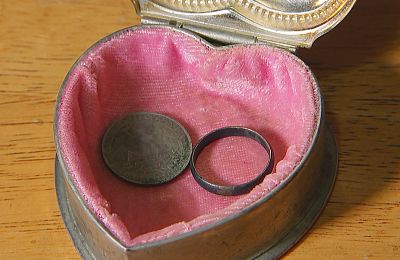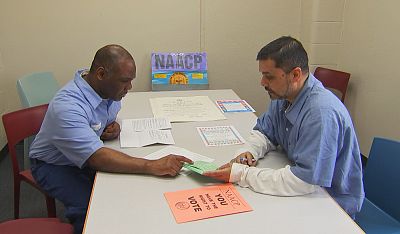Inmates in Maine can cast ballots. NBC News went behind bars to find out more about what's become an issue in the presidential race.
AUGUSTA, Maine — Diane and Jim Gagnon store their son's only remaining possessions in a heart-shaped keepsake box.
"It was a ring that he had on his finger and there was two quarters," Diane said while holding the opened box. "There wasn't much left because it was all skeleton."
The mementos are a painful reminder of that day in 1990, when the remains of their son, Jeff Gagnon, 25, were found in the woods off a country road.
The man convicted of his murder was Danny McCluskie, who police say shot Gagnon twice in the back after he discovered Gagnon had been dating his wife. McCluskie is serving a 50-year sentence.
The Gagnons say they hadn't thought much about their son's killer since the trial. But thanks to a debate over voting rights for prisoners spurred by Sen. Bernie Sanders, they're thinking of McCluskie in a new light.
"Yes, even for terrible people," Sanders, I-Vt., said when asked at a CNN town hall last month whether rapists and murderers like the convicted Boston Marathon bomber Dzhokhar Tsarnaev should be able to vote from behind bars.
"Because once you start chipping away and you say, 'Well, that guy committed a terrible crime, not going to let him vote. Well, that person did that. Not going to let that person vote,' you're running down a slippery slope," Sanders added.
Inside the concrete walls of Maine State Prison's visitation room, convicted murderer Foster Bates says the issue is complex.
"Just because a person's incarcerated, that doesn't make him less of a citizen," Bates told NBC News. "That doesn't make him less of a human being. People are going to make mistakes in their lives."
Found guilty of murder in 2002, Bates now serves as the president of a special chapter of the NAACP formed inside the prison. Bates says he's voted in every election since his incarceration began. And although he's serving a life sentence, he believes he will get out someday on appeal.
"You want to have a say on the people making decisions about your life, regardless of where you are," he said. "Because the people on the outside are going to make decisions for things when you get ready to go home, too."
Maine and Vermont are the only two stateswhere felons never lose the right to vote, even while in prison.
"Once they're released, they want to vote then? Fine," Jim Gagnon said. "But while they're in there serving, they should not be allowed to vote. They lost that right the minute they committed a murder and (were) convicted of a murder."
Allowing inmates to vote has drawn similarly strong rebukes from President Donald Trump, Sen. Lindsey Graham, R-S.C., and Republican National Committee Chairwoman Ronna McDaniel, who called the idea "radical."
"Let terrorists that are in prison vote? I don't think so," Trump said last week during a speech to the NRA. "Can you believe it? But this is where some of these people are coming from."
As a founder of the Maine chapter of the Parents of Murdered Children, Diane Gagnon wants lawmakers like Sanders to know exactly how the group feels.
"My son didn't get a chance to vote," she said. "Why would you allow someone that has committed a murder or manslaughter — why would you allow him to vote when my son couldn't vote?"
Bates, along with NAACP vice president Santanu "Sam" Basu — also convicted of murder — registers other prisoners to vote and even hosts town halls in the prison for candidates.
Maine law requires prisoners to register from their last address, ensuring that a cell block can't become a powerful voting bloc. But for Bates and Basu, it's less about political influence and more about a sense of purpose.
"Because we have to have our voices heard," Bates said. "Because we are just as much a part of this country as...who's outside these walls. Because we're incarcerated doesn't mean that we should lose our right to vote because when I leave this facility, I'm a citizen still."
He understands why a devastated family like the Gagnons disagrees.
"It's not much you can say to the family as to why this person should vote," Bates said. "But the answer that I would give is that you have to at some point in time say: If that person comes back to society, you want to have a changed person, not the person who committed the heinous crime."
But for the Gagnons, that argument doesn't hold water.
"Where was our son's rights?" Jim Gagnon asked. "Because the minute that happened, all his rights — his rights for everything, to raise a family, to vote — everything was completely taken away."













